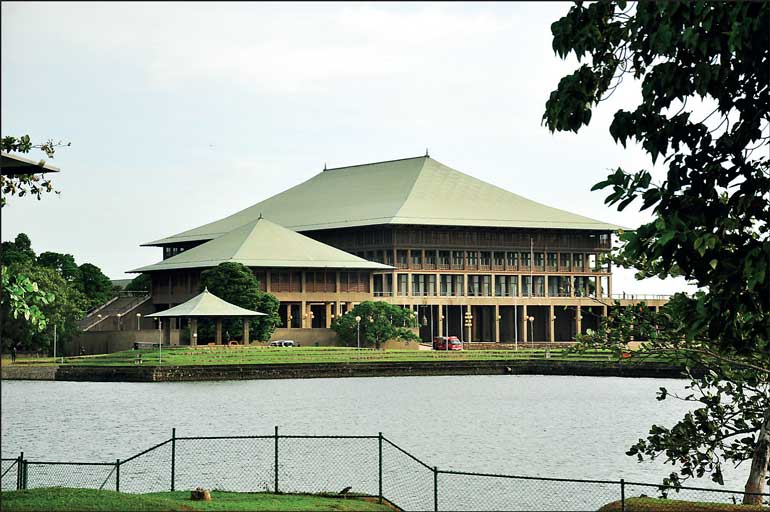Tuesday Feb 17, 2026
Tuesday Feb 17, 2026
Friday, 14 January 2022 00:25 - - {{hitsCtrl.values.hits}}

The price the country has already paid for the reform program of independent commissions based on a system of Constitutional Council is extremely heavy – Pic by Shehan Gunasekara
 Professor Rohan Samarajiva had rebutted my criticism of the constitutional reform proposals unveiled by the National Movement for a Just Society. The editor of the “Anidda” newspaper also had written a comment about the tone of my criticism. He had attempted to show my criticism as one that promotes hatred. I do not intend to dwell upon his criticism, and will only respond to Samarajiva’s views and arguments on the system of independent commissions.
Professor Rohan Samarajiva had rebutted my criticism of the constitutional reform proposals unveiled by the National Movement for a Just Society. The editor of the “Anidda” newspaper also had written a comment about the tone of my criticism. He had attempted to show my criticism as one that promotes hatred. I do not intend to dwell upon his criticism, and will only respond to Samarajiva’s views and arguments on the system of independent commissions.
There is no doubt that the modern states should have independent institutions to regulate and oversee various services such as the public service, the judiciary, human rights abuses, anti-corruption and government auditing. But I do not think the system of independent commissions established in terms of the 17th Amendment or the 19th Amendment based on the Constitutional Council is the best way to do it. I can be considered as one who has criticised that system for a long time.
The approach taken to establish the system of independent commissions based on the Constitutional Council, and the structure introduced for that are confusing. The Constitutional Council was set up without vesting it with the power of review and direction. The Constitutional Council was not even granted the right to investigate and report when those who were appointed to higher positions were found committing serious wrongdoings.
Here is a shocking example that can be cited to substantiate this. On the night of 7 July, 2004, a man and a woman were searched by police when they were found half naked in a vehicle parked near Diyawanna Oya. The Police identified the man inside the vehicle, who had his trouser removed as the Chief Justice of the country (Sarath Nanda Silva). Subsequently, the half-naked woman inside the vehicle was identified as a married lawyer. Although it was a serious incident that brought the entire judiciary into disrepute, the Constitutional Council did not take any acceptable course of action in regard to this incident.
The Constitutional Council may not have the power to remove a Chief Justice from his post. But it should have been given the authority to investigate such issues and report to Parliament. On the other hand, if we had a well-functioning institutional system, avoiding political interference alone in the appointments to higher positions would have been sufficient for their wellbeing. But our institutional system is not so. It is corrupt and rotten to the core.
Under the circumstances, isn’t it important to find out whether the heads of the state institutions possess adequate capacity and acumen to make a positive difference in the institution which they lead, or whether they have a vision for that when they are appointed for higher positions? Also, shouldn’t the Constitutional Council have the authority to oversee the functioning of the heads of institutions when it appoints them for higher positions in respective institutions? But the Constitutional Council did not have such power.
Experiences
The system of commissions established did not bring about a profound change in the system of institutions that affect the public, such as the Commission to Investigate Bribery or Corruption, the Judiciary, the Attorney General’s Department or the Police. The Independent Commission Against Corruption (ICAC) established in Hong Kong in 1974 liberated the country which had the highest level of corruption in Asia in 20 years and made it one of the cleanest states having a very high per capita income in the world. Since its inception, the Commission has been committed to fighting corruption using a three-pronged approach of law enforcement, prevention and education.
Hong Kong now has fundamentally a clean public service. Internationally, Hong Kong is now recognised as one of the least corrupt places in the world. The Commission to Investigate Bribery or Corruption in Sri Lanka has been set up, at least without emulating the example of the Commission to Investigate Corruption in Hong Kong or Singapore. It need not stress how backward our Election Commission is, when compared to the Election Commission of India, not only in terms of the structure but also in practice. The gap between the two is as wide as the earth and the sky.
Those who designed the Election Commission of Sri Lanka have not followed at least the example of the Election Commission of neighbouring India. Dayananda Dissanayake, a former Commissioner of Elections, in an inquiry made by me at that time said that he was not consulted at all, when the Election Commission was incorporated by the 17th Amendment. This explains the arbitrary manner in which the system has been built. The system of Independent Commissions introduced by the 17th and 19th Amendments seems to me as a costly, ineffective and wasteful system established without correcting the serious structural flaws inherent in the institutional system of the country, simply giving it a beautiful and solemn appearance on the surface.
While the Professor, displaying the glory of his intellect has proposed a costly and circuitous system of regulation and supervision, I would like to point out the simple methods used by the United States, the United Kingdom, India and Nepal in appointing members to their Human Rights Commissions. There are eight members in the US Commission on Civil Rights (CCR), of them four are appointed by the President. Two others are appointed on recommendation of the leaders of the majority and minority groups in the Senate. The other two are appointed on recommendation of the leaders of the majority and minority groups in Legislature. The Chairman of the Commission is nominated by the President.
The six members of the Equality and Human Rights Commission (EHRC) of the UK are appointed by the Minister for Women and Gender Equality.
The National Human Rights Commission (NHRC) of India consists of 13 members. Seven of them are Chairpersons of seven National Commissions of specific castes and tribes; and they serve as ex officio members. The relevant Act contains the criteria applicable to Chairperson and the other members. Only a former Chief Justice of India or a Supreme Court Judge can be appointed as the Chairperson.
The five members, including the Chairperson are recommended to the President by a committee consisting of the Prime Minister, the Minister of Home Affairs, and the Leader of the Opposition in the Lok Sabha, the Leader of the Opposition in the Rajya Sabah, the Speaker of the Lok Sabha and the Deputy Leader of the Rajya Sabah.
Nepal appoints the chairman and the other members to the National Human Rights Commission (NHRC) through the Constitutional Council. The Constitutional Council consists of the Chief Justice, the Chief Commissioner of the Commission for the Investigation of Abuse of Authority (CIAA) and its members, the Auditor General and Chairman of the Public Service Commission and its members.
Faults in the system
The main reasons for the failure of the system of independent commissions established under the Constitutional Council in Sri Lanka are as follows. The system of Independent Commissions operating under a system of Constitutional Council was developed hastily without studying the relevant facts carefully and adequately, and also without taking the appropriate models available elsewhere in the world into consideration. The result has been a flawed, mismatched, costly, inefficient and weak system.
The biggest flaw in the overall approach seems to be that, as pointed out in the first article, the two constitutional amendments used for that can be described as a foolish attempt to tie a giant wild elephant with a weak rope strong enough to tie only a small animal like a goat. According to the constitution, the president remains above the law. No matter how serious an offense he commits while in office, he cannot be prosecuted under the present constitution.
In this context of constitutional protection enjoyed by the President, the obligation made on him by the Constitution Council set up in terms of the 17th and 19th Amendments cannot be considered to be binding. It can be made a strong legal obligation only by legislating a constitutional amendment so that the president will be deprived of his ability to be above the law, and subject him to the rule of law. The system of independent commissions was established under the 17th Amendment initially and later the 19th Amendment without depriving the President of his power to be above the rule of law.
The 17th Amendment had been violated not only by President Mahinda but also by President Chandrika before that. President Chandrika refrained from appointing retired Supreme Court Judge Dheeraratne who had been recommended to the Elections Commission, citing his affiliation with the UNP. It became such a protracted issue that made it impossible for Election Commissioner Dissanayake to retire even after reaching his retirement age. Eventually, the Commissioner of Elections went to the Supreme Court seeking some relief, but in vain. Then in 2006, President Mahinda Rajapaksa appointed members to the Police Commission and the Public Service Commission regardless of the constitutional council.
The 17th amendment was abolished by the 18th amendment in 2010. The Yahapalana regime which came to power in 2015 brought the 19th Amendment and introduced a system of independent commissions functioning under a system of Constitutional Council without carefully considering the unfortunate experiences of the 17th Amendment and rectifying the serious flaws existing in that system. Once again, the attempt to tie the wild elephant was made in the usual foolish manner with a weak rope used to tether a goat.
The price the country has already paid for the reform program of independent commissions based on a system of Constitutional Council is extremely heavy. It can be considered as a subject that has not been subjected to an in-depth analysis. It can also be considered as an important factor that has contributed to the failure of the Yahapalana regime and disrupt its existence and functioning.
Why did the Yahapalana regime bring the 17th Amendment to the fore again with only a few minor changes to it, without correcting the flaws inherent in the system of commissions set up under a Constitutional Council, when the 17th Amendment had already become a failed experience? Why is it that a strong attempt is being made again to present this old hackneyed system in a new wrapper as a choice for the future when it had already failed for the second time as well?
It can be considered as a thing that leads to curiosity, and deserves to be probed. As far as I know, Prof. Samarajiva is a well-informed, innovative and keen thinker. But his comments on the system of independent commissions seems to me to be in stark contrast to his image.